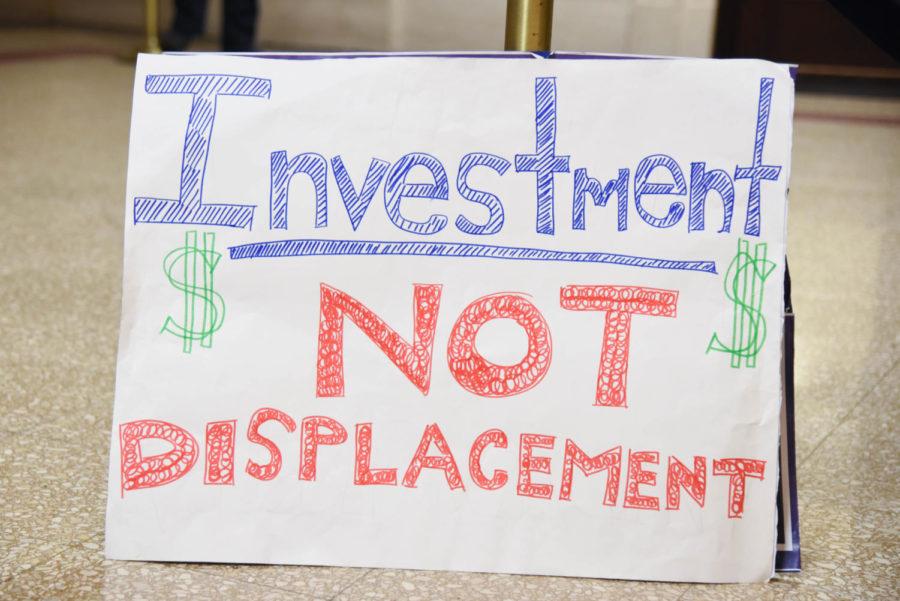The Chicago Plan Commission voted unanimously for six proposals important to the construction of the Obama Presidential Center (OPC) on Thursday afternoon.
The vote came after hours of testimony from both supporters and opponents of the proposals, many of whom had been demonstrating outside City Hall since 5 a.m.
The proposals centered around modifying boundaries of the Center and in particular closing Cornell Drive, a busy six-lane highway that runs through Jackson Park, where the OPC will be located.
While this vote was a major victory for the Obama Foundation, the non-profit organization that oversees the creation of the OPC, there remains a long process before the OPC can break ground. The plans will be presented to the city’s Zoning Committee next week, and then to City Council, which will vote on approving a formal long-term lease of city land to the Obama Foundation.
The project is also still undergoing federal review to determine whether the Foundation is taking legitimate efforts to minimize harmful effects to the surrounding parkland, as Jackson Park is included on the National Register of Historic Places. A group of public park activists opposed to the presidential center filed a federal lawsuit Monday trying to block the development.
“We are heartened by the outpouring of enthusiasm and support for the OPC,” said David Simas, CEO of the Obama Foundation. “We look forward to continuing to work with our neighbors, the City Council and the Chicago community more broadly to make the vision and mission of the OPC into reality.”
Hours before the meeting started, both supporters and opponents of the proposals gathered outside City Hall, where they passionately chanted in favor of their respective sides. The Obama Foundation gave its supporters T-shirts with the Foundation’s logo and pins that read “OPC” and “I was there.”
Many of the opponents of the proposal gathered outside City Hall were members of the Community Benefits Agreement (CBA) Coalition, a group of community organizations that have been calling for an ordinance that would ensure the Foundation, UChicago, and the City work to guarantee that local residents benefit from employment, housing, and other opportunities linked to the Center. The Foundation has refused to sign a CBA, but two weeks ago, it released a Community Commitments document outlining employment opportunities and promises tied to the OPC’s development.
Michael Strautmanis, the Foundation’s vice president of civic engagement, addressed CBA concerns in the meeting. “For those who have talked about the CBA issue that has been brought up, I just want to thank them for the way they’ve sharpened our thinking…. We will continue to meet with them, because we have no monopoly on great ideas.”
Shortly after the meeting began, members of the CBA coalition disrupted the meeting, and then were led out by security while chanting “No CBA, no vote.” In last month’s Plan Commission meeting, which did not concern any plans regarding the OPC, members of the CBA Coalition also disrupted proceedings to demand to the Commission: “do not approve the Obama Center.”
Fifth Ward Alderman Leslie Hairston, whose ward includes the site of the OPC, called several of the organizers who came to City Hall “professional protesters,” according to the Chicago Sun-Times. She said that “some people just don’t know when they’ve got a win,” referencing the Community Commitments document. She said that the OPC is an asset for the city and explained that she is working on a neighborhood stabilization plan for local residents.
After statements by aldermen and other city officials, the Plan Commissioners opened the floor to public testimony. Over a hundred residents and activists spoke, with many focusing on the proposal to close Cornell Drive.
In February, the Chicago Park District approved plans to turn parts of South Cornell Drive into parkland—specifically a pedestrian and bike path. In turn, the Park District would give six acres of its own parkland to widen parts of roads around Jackson Park.
Last week, a non-profit group called Jackson Park Watch sent a request to the Plan Commission to reject the proposals. The group cited a road study that suggests that closing Cornell Drive is not necessary.
At the meeting, Jackson Park Watch President Margaret Schmid said that while she welcomes the center, there are still urgent questions about the feasibility of the road closures that have not been addressed.
On the other hand, many residents spoke in favor of closing Cornell Drive.
Erin Adams, a biology professor at the University of Chicago, said that from driving daily on Cornell Drive, she knows that it is a “dangerous highway,” where “cars there exceed the speed limit by 20, 30 miles per hour.” Adams added that many of her colleagues also support the closing of Cornell Drive. She submitted for the public record a letter that was signed by 440 University affiliates and community members.
As the time for the vote neared, supporters of the OPC came to give final testimonies.
A representative from the DuSable Museum of African American History, which the Obama Foundation identifies as a partner in its Community Commitments document, said that “without the OPC and the economic and social impact it will bring, our institution would likely continue to be under-resourced.”
“The long overdue attention to [the DuSable Museum’s] accomplishments and the application of our story in the context of President Obama’s story is something so strong, so essential, that we ought to let nothing stand in the way of its success,” the representative said.
Many commissioners also spoke in favor of the OPC. Commissioner Leslie Bond said that “as a conscious Black man, I have struggled and been frustrated by the lack of inclusion and diversity in some of the larger and more impactful projects presented to this commission. Today’s presentation is the best plan for inclusion and diversity that I have seen in five years.”
Once final results of the vote were announced, the remaining community members at the meeting broke out in cheers and applause.









